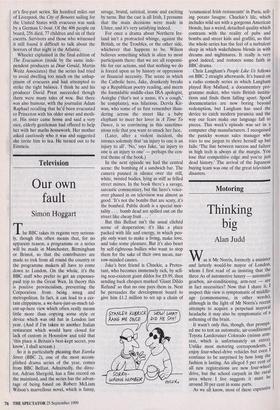Television
Our own fault
Simon Hoggart
The BBC takes its regions very serious- ly, though this often means that, for no apparent reason, a programme or a series will be made in Manchester, Birmingham or Bristol, so that the contributors are made to trek from all round the country or the programme makers all have to come down to London. On the whole, it's the BBC staff who prefer to get an expenses- paid trip to the Great Wen. In theory this is positive provincialism, preventing the Corporation from being smug and metropolitan. In fact, it can lead to a cer- tain chippiness, a we-have-just-as-much tal- ent-up-here view which often really means little more than copying some style or device which was old hat in London last year. (And if I'm taken to another Italian restaurant which would have closed for lack of custom in Hounslow and told that `this place is Britain's best-kept secret, you know', I shall scream.) So it is particularly pleasing that Eureka Street (BBC 2), one of the most accom- plished drama series of the year, comes from BBC Belfast. Admittedly, the direc- tor, Adrian Shergold, has a fine record on the mainland, and the series has the advan- tage of being based on Robert McLiam Wilson's marvellous novel, which is funny, savage, brutal, satirical, ironic and exciting by turns. But the cast is all Irish, I presume that the main decisions were made in Ulster, and it's very satisfying indeed.
For once a drama about Northern Ire- land isn't a protracted whinge, against the British, or the Troubles, or the other side, whichever that happens to be. Wilson believes something which is alien to most participants there: that we are all responsi- ble for our actions, and that nothing we do is forced upon us by history or oppression or financial necessity. The scene in which the Catholic hero, Jake, drunkenly breaks up a Republican poetry reading, and meets the formidable middle-class IRA apologist, Aoirghe (`that's not a name, it's a cough,' he complains), was hilarious. Dervla Kir- wan, who some of us first remember thun- dering across the street like a baby elephant to meet her lover in A Time To Dance, is so convincing in this sanctimo- nious role that you want to smack her face.
(Later, after a violent incident, she intones solemnly that 'an injury to one is an injury to all'. 'No,' says Jake, 'an injury to one is an injury to one' — perhaps the cen- tral theme of the book.) In the next episode we had the central scene: the bombing of a sandwich bar. The camera panned in silence over the still, white, twisted bodies, lying as stiff as felled street mimes. In the book there's a savage, sarcastic commentary, but the hero's voice- over phased in on television was almost as good: 'It's not the bombs that are scary, it's the bombed. Public death is a special mor- tality . . . bomb dead are spilled out on the street like cheap fruit . . . '
But this Belfast isn't the usual cliched scene of desperation; it's like a place packed with life and energy, in which peo- ple only want to make a living, make love, and take some pleasure. But it's also beset by self-righteous bullies who want to stop them for the sake of their own mean, nar- row-minded causes.
Jake's best friend is Chuckle, a Protes- tant, who becomes immensely rich, by sell- ing non-existent giant dildos for £9.99, then sending back cheques marked 'Giant Dildo Refund' so that no one pays them in. Next he persuades the development board to give him £1.2 million to set up a chain of `ecumenical Irish restaurants' in Paris, sell- ing potato lasagne. Chuckie's life, which includes wild sex with a gorgeous American blonde, has a weird, detached quality which contrasts with the reality of pubs and bombs and street kids and graffiti, so that the whole series has the feel of a turbulent sleep in which wakefulness blends in with dreams and nightmares. It really is very good indeed, and restores some faith in BBC drama.
Chris Langham's People Like Us follows on BBC 2 straight afterwards. It's based on a radio comedy series in which Langham played Roy Mallard, a documentary pro- gramme maker, who visits British institu- tions and finds them falling apart. Spoof documentaries are now boring beyond redemption, but Langham has used the device to catch modern paranoia and the way our fears make our language fall to pieces. This week's episode was set in a computer chip manufacturers. I recognised the panicky woman sales manager who tries to use jargon to shore herself up but fails: 'The line between success and failure in high tech is always at the margin. You lose that competitive edge and you're just dead history.' The arrival of the Japanese buying team was one of the great television disasters.


























































































 Previous page
Previous page